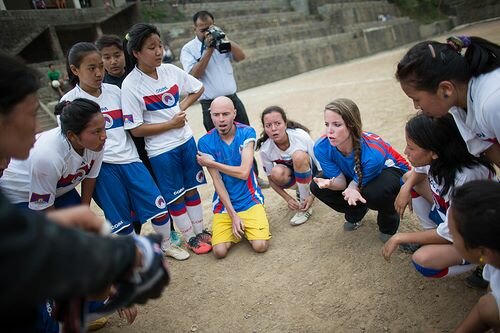A Brief History of Tibet
In 1949 China began its invasion of the sovereign Buddhist nation of Tibet, a massive, remote Himalayan kingdom. China's invasion, brought on by its desire to control Tibet's rich natural resources and strategic borders alongside India, still continues today. The Chinese occupation has resulted in the death of over one million Tibetans, the destruction of over 6,000 monasteries, nunneries and temples, and the imprisonment and torture of thousands of Tibetans. The basic freedoms of speech, religion, and assembly are strictly limited, and arbitrary arrests continue. There are currently hundreds of political prisoners in Tibet.
The Dalai Lama, Tibet's political and spiritual leader, fled Tibet in 1959 to Dharamsala, India, trekking over the Himalayas on foot and horseback. He has been followed by over 100,000 Tibetans to date, and has established the Tibetan Government-in Exile. In 1989, he was awarded the Nobel Peace Prize for his steadfast dedication to non-violence, and the highest US civilian honor, the Congressional Gold Medal, in 2007. Every day more refugees arrive in India from Tibet, 6 decades after the initial invasion.
How Our Cause Was Born
The social climate in Dharamsala is complex. Tibetans displaced from their homeland gather on the edge of the Himalayas in India to start new lives and learn to survive in a foreign land. Life can be difficult, especially for females. Much of the burden of making a new home and adjusting to a new society falls upon them. They experience limited opportunities to express themselves physically and recreationally. Organized sports are a way for female Tibetans to enrich their lives through playful interaction with each other and by generating a new, positive presence in their community.
This program was conceived by Cassie Childers, an American teacher and life-long soccer player. A frequent visitor to Dharamsala, Cassie always hoped she would would find a way to give back to the community that has given so much to her. During 2010 World Cup fever, while Cassie was visiting, she attended an exhibition showcasing the history of Tibetan soccer. She realized that she was the only female in the large hall. Shocked, a Tibetan friend pointed her in the direction of the Tibet National Sports Association. One month later, Cassie was extended the invitation to come and start a soccer program for girls.
As of May 2015, Tibet Women's Soccer is proud to announce its reincorporation as a completely independent association committed to the ideals of gender equality and self-determination.
Our decision to go independent was based on the realization and supporting evidence that our goals of women's empowerment and sports diplomacy could not effectively be achieved without managerial autonomy and administrative/financial independence.
To date, Tibet Women's Soccer has engaged more than 3,000 young Tibetan women living in exile, and continues to expand. We are confident in our ability to continue expanding our program offerings within the Tibetan exile community, and are staging our association for major progression under these new reforms.
We celebrated by signing a new sponsorship deal and organizing our first independent camp in Clementown, followed by our first international appearance at a tournament in Germany.
We sincerely thank all of our supporters, and look forward to sharing our progress with you as the momentum continues to build. TWS's new headquarters is based in Clementown Tibetan Settlement in Dehradun, where 'Soccer is our Religion.'
The goal of this project is to inspire in the girls and women of the Tibetan refugee community a new sense of pride in themselves and hope for their futures. Within their community they will experience a powerful shift in the perceived social strata, and internationally, assuming that the initial introduction leads eventually to the formation of a national team, they will feel a sense of belonging and representation in connection to their homeland while living in exile.
Our Method
Tibet women's soccer is supported by our partners at Tempotips.
Tibet Women's Soccer aims to facilitate the expansion of the female Tibetan voice, nurture the idea that Tibetan women possess the talent and capabilities equivalent to men, forge the bonds of sisterhood and provide an arena in which they can safely experiment with these new developments. Tibet Women’s Football does not rely solely upon football to provide the education needed to promote self-confidence, gender equality and development of voice – it provides a professional, well-rounded curriculum of leadership, team building, gender equality, health and communication complimenting all its soccer training sessions as well. Soccer is simply the tool by which we frame and deliver lessons and experiences focused on these themes.
.jpg)
.jpg)
